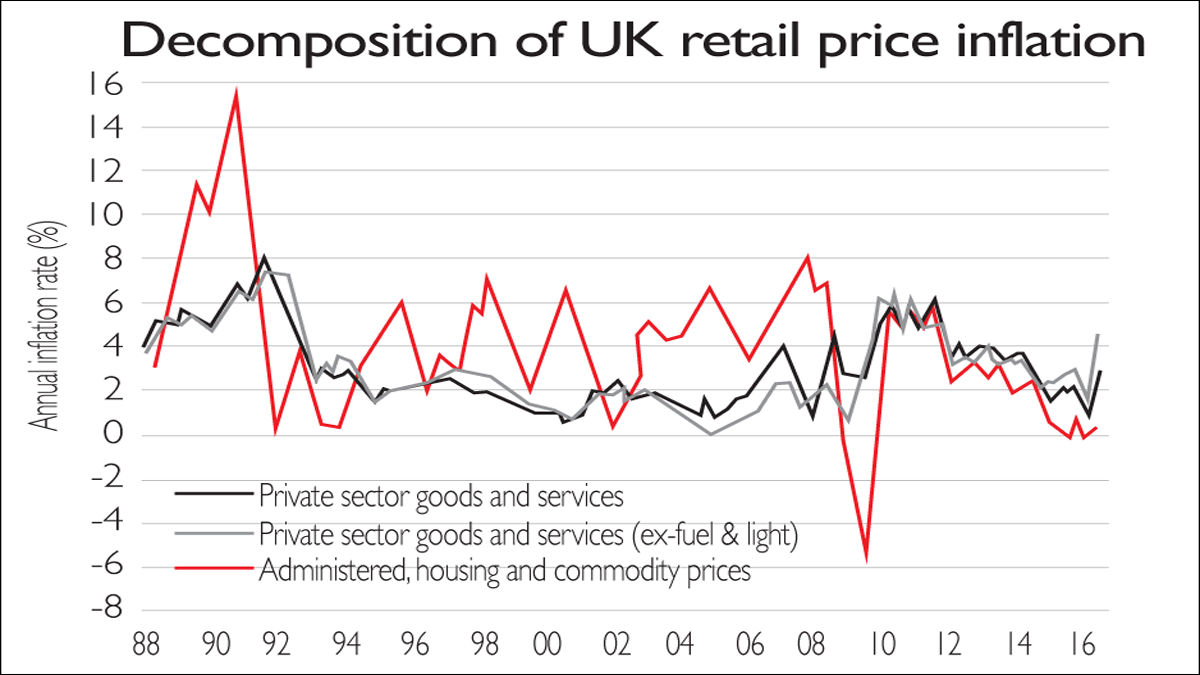Inflation forecasts are wishful thinking
Those who are expecting prices to fall sharply post-Brexit may be in for a surprise, says Peter Warburton.
Get the latest financial news, insights and expert analysis from our award-winning MoneyWeek team, to help you understand what really matters when it comes to your finances.
You are now subscribed
Your newsletter sign-up was successful
Want to add more newsletters?

Twice daily
MoneyWeek
Get the latest financial news, insights and expert analysis from our award-winning MoneyWeek team, to help you understand what really matters when it comes to your finances.

Four times a week
Look After My Bills
Sign up to our free money-saving newsletter, filled with the latest news and expert advice to help you find the best tips and deals for managing your bills. Start saving today!

The notion that grindingly slow economic growth will be accompanied by long-term stagnation in consumer prices has had a powerful grip on the bond market. Throw in the demographic and technology arguments, and the "new normal" crowd reckon that a future of low or no inflation is a slam dunk.
Then came Brexit and an abrupt 13% depreciation of Sterling. How have the new normal crowd reacted? It is no surprise that their instincts are to downplay the inflationary impact of Brexit. They expect headline consumer price index (CPI) inflation to rise only moderately over the coming year, touching 2% at worst and averaging only 1.5% for 2017. Sluggish domestic demand will open up a large output gap and exert disinflationary pressure. Weakness in core goods and services prices will counteract the partial recovery of the oil price, and the impact of the drop in sterling on import prices.
Those of us with long memories tend to take a very different view. The UK has been one of the most inflation-prone countries in western Europe over the past 25 years. Our 20th century peak inflation rate was 25% a year, in 1975. We managed double-digit CPI inflation as recently as 1990. The UK is heavily dependent on imports across a wide swathe of manufacturing sectors, susceptible to bouts of money madness and protective of oligopolies in consumer-facing sectors such as megastores and car dealerships. Ripping off the punter is a national sport.
MoneyWeek
Subscribe to MoneyWeek today and get your first six magazine issues absolutely FREE

Sign up to Money Morning
Don't miss the latest investment and personal finances news, market analysis, plus money-saving tips with our free twice-daily newsletter
Don't miss the latest investment and personal finances news, market analysis, plus money-saving tips with our free twice-daily newsletter
A decomposition of the retail price index (RPI) shows private sector inflation (excluding fuel and light) rebounding over 3% see the grey line on the chart to the right. We prefer the old RPI measure for this analysis because it includes housing. The chart shows that UK inflation remains elevated in comparison with the 1992-2007 period. The global financial crisis marked the beginning of a new era of erratic, generally higher UK inflation, because the crisis weakened domestic competition and allowed the profitability of the service industries to soar to new heights.
In common with other advanced economies, headline CPI inflation flirted with negative inflation last year under the full force of the energy price collapse. But the starting gun on inflation normalisation was fired in May 2016 and over the next 12 months, the bias will be to an annual increase. The new normal crowd are dismissive of normalisation and Brexit-related pressures, which they expect to be muted and temporary. Yet we can observe already a substantial impact on imported inflation in the July and August producer price inflation data.
Based upon the historical relationship between import inflation and CPI inflation for non-energy industrial goods, headline CPI inflation should move up by 1.5 to 2.0 percentage points from its current 0.6% by mid-2017. For RPI, theimplied shift is from 1.9% currently to around 3.5% by mid-2017.
Lower forecasts for inflation suggest a marked degree of compression in companies' profit margins. Our sympathies are with the conventional view of producer-price inflation being passed-through to higher consumer prices. Any output loss from Brexit is likely to be gradual and cumulative over the next three years, not sudden so the domestic economy should not suffer an "air pocket" effect and resulting disinflationary effects. Anyway, without an initial post-referendum output and spending slump, there is no justification to expect prices to drop sharply.
UK inflation break-evens the inflation rate implied by the difference between the yield on nominal UK government bonds and inflation-linked ones based on RPI have risen in anticipation of the changing landscape. However, they have still risen by too little properly to reflect the higher inflation coming our way.
Peter Warburton is the founder and chief economist of Economic Perspectives.
Get the latest financial news, insights and expert analysis from our award-winning MoneyWeek team, to help you understand what really matters when it comes to your finances.
Dr Peter Warburton is director of Economic Perspectives Ltd.
-
 Should you buy an active ETF?
Should you buy an active ETF?ETFs are often mischaracterised as passive products, but they can be a convenient way to add active management to your portfolio
-
 Power up your pension before 5 April – easy ways to save before the tax year end
Power up your pension before 5 April – easy ways to save before the tax year endWith the end of the tax year looming, pension savers currently have a window to review and maximise what’s going into their retirement funds – we look at how